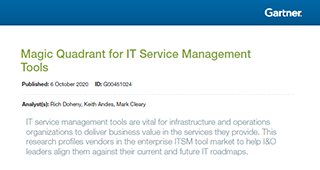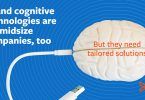Digital transformation is a reality for many enterprises looking to maximize their growth and adaptability to oncoming business needs. The limitations of human-driven ITSM are becoming increasingly pronounced in the face of developments like:
AI and Service Management Technology Trends
According to Forrester’s 2019 Predictions, AI and RPA are joining forces to create the cognitive enterprise. AI is often used as an umbrella term that includes processes like RPA; however, the power of AI lies in machine- or deep-learning. RPA refers to automated workflows that mimic human interactions.
IOT is connecting the world around us to the web and presenting new challenges for enterprises in terms of logistics and security. Multi-cloud technology is enabling enterprises to transcend the limitations of single vendors, expanding their cost-efficiency and flexibility. Today, human-driven ITSM efforts are bottlenecking growth in the face of these trends, necessitating the shift toward a cognitive enterprise.
From IT Service Management to Cognitive Service Management with AI
Cognitive service management (CSM) offers a solution to many of the ITSM issues faced by growing enterprises. The typical IT support levels of L0/L1/L2 are being transformed through the use of chatbots and virtual agents, turning inaccurate and expensive manual processes into fast, accurate, and cost-efficient cognitive processes using AI, ML (machine learning), and RPA.
The Journey to the Cognitive Enterprise
Traditional online enterprises use human-driven ITSM to address the needs of consumers. This approach is made effective through the excellence of individual employee performance, but agents are limited in their engagement and productivity, primarily due to manual, repetitive tasks.
As enterprises grow in digital maturity, they begin to discover the application of multi-cloud, multi-device (IoT), and multi-channel strategies. Web, mobile, and social channels are explored as avenues for service management. It’s in this environment that the digital enterprise functions.
As new technologies of the cognitive enterprise are adopted, service management becomes both proactive and predictive, using AI in virtual agents and chatbots to automate service management tasks. This frees up human agents to maximize their engagement and productivity across a wide range of applications.
How AI Simplifies the Life of a Service Desk Agent
Today, successful service management relies on five steps:
- The end-user calls the service desk
- The L1 agent creates the ticket
- The agent picks the appropriate support category for the ticket
- The ticket gets routed to the right support group
- The ticket gets resolved
When this works as planned, customers are happy. The limitations of traditional ITSM become apparent when a mistake is made along this chain of processes. If an agent picks the wrong category for the ticket and the wrong support team receives it, the ticket will be sent back to the agent for reassignment. This creates a loop of low productivity and unhappy customers.
Soon, a day in the life of a service desk agent will look significantly different. Chatbots and virtual agents handle initial contact and ticket creation, and appropriate agents are classified automatically. In addition, the cognitive service desk provides suggestions, recommendations, and assignments. This leads to significantly more efficient ticket resolution, which results in happier customers.
BMC Helix Cognitive Suite: Making AI Work for Your Service Management
The BMC Helix suite of solutions is an everything-as-a-service (XaaS) platform that offers capabilities across:
- AWS
- Microsoft Azure
- Kubernetes
- Docker
- And more
Virtually every element of service management is offered as a service, including BMC Helix Discovery, BMC Helix ITSM, BMC Helix Business Workflows, BMC Helix Digital Workplace, and BMC Helix Chatbot. These functions interact with various platform-specific micro-services, contributing to the cognitive enterprise.
The 4 Cs for Your Future-Ready AI Enterprise
When it comes to building a future-ready enterprise, keep these letters in mind:
- Cloud contains XaaS capabilities.
- Containers solve the problem of running software reliably within multi-environment applications. BMC Helix allows you to run in your choice of multi-cloud (BMC, AWS, or Azure).
- Cognitive refers to the transformation of traditional ITSM to CSM by embedding cognitive capabilities.
- Channels bring choice to your experience: Slack, Web, SMS, etc.
At BMC, we have an ambition to reduce service desk tickets by 40%. To discover the power of cognitive service management that delivers a 354% ROI for your enterprise, personalize your BMC Helix demo today.







